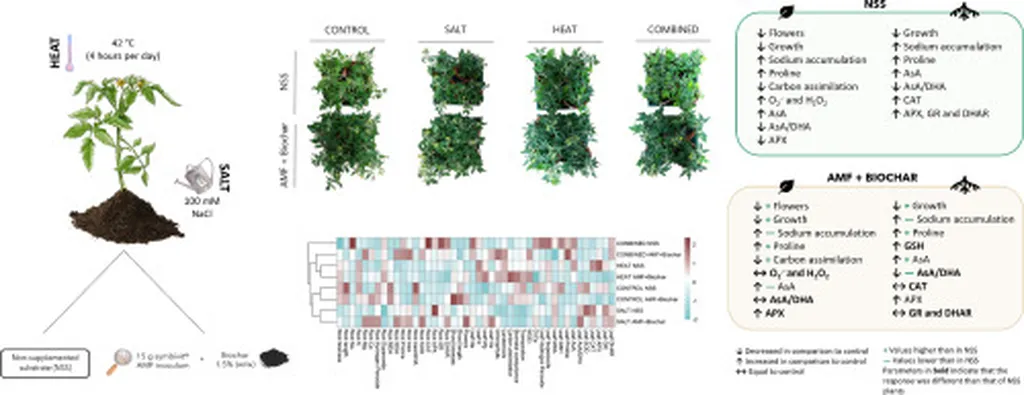In the face of growing agricultural challenges posed by saline-alkaline soils, a novel solution has emerged from the labs of Universidad Autónoma Agraria Antonio Narro in Mexico. Researchers have found that citric acid-modified coconut shell biochar can significantly mitigate the stress these soils impose on tomato plants. This breakthrough, published in the journal *Open Agriculture*, offers a promising avenue for enhancing crop resilience and productivity in affected regions.
Saline-alkaline stress is a formidable adversary in agriculture, altering soil properties, reducing nutrient availability, and causing oxidative damage that stunts plant growth. The study, led by Melisa Méndez-Martínez, explored the potential of coconut shell biochar (CSB) functionalized with citric acid (BCA) or ascorbic acid (BAA) to combat these effects. The research focused on tomatoes grown in calcareous soil, a common substrate in many agricultural areas.
The findings are compelling. The application of 10.00 grams of BCA per kilogram of soil increased potassium content in the petiole cell extract by 79%, while a lower dose of 1.25 grams per kilogram boosted yield by an impressive 43.03%. “The results indicate that citric acid-functionalized biochar can significantly enhance the plant’s ability to cope with saline-alkaline stress,” Méndez-Martínez explained. This enhancement is attributed to the biochar’s ability to modulate enzyme activity both in the plant and the soil, fostering a more conducive environment for growth.
The study also revealed that BCA treatment increased glutathione (GSH) content by 152.28% and RuBisCO activity by 22.85%. These improvements are crucial for plant health and productivity. Additionally, the biochar induced positive modulation in various antioxidant systems, including total phenol content (+7.4%), flavonoids (+72.9%), glutathione peroxidase (+687%), catalase (+62%), and ascorbate peroxidase (+20.2%) activities. In the soil, the biochar enhanced alkaline phosphatase (+87%), urease (+35.8%), β-N-acetylglucosaminidase (+20%), and fluorescein diacetate hydrolysis (+155.7%) activities.
The commercial implications of this research are substantial. Saline-alkaline soils are a global issue, affecting millions of hectares of arable land. The use of citric acid-modified coconut shell biochar presents a sustainable and cost-effective strategy for farmers to improve crop yields and resilience. “This approach not only addresses the immediate problem of saline-alkaline stress but also contributes to long-term soil health and sustainability,” Méndez-Martínez noted.
The research published in *Open Agriculture* from the Doctorado en Ciencias en Agricultura Protegida at Universidad Autónoma Agraria Antonio Narro, offers a beacon of hope for the agriculture sector. As the world grapples with the challenges of climate change and soil degradation, innovative solutions like this one are crucial. The study paves the way for further exploration into the use of functionalized biochar in agriculture, potentially revolutionizing how we address soil-related stresses and enhance crop productivity.

